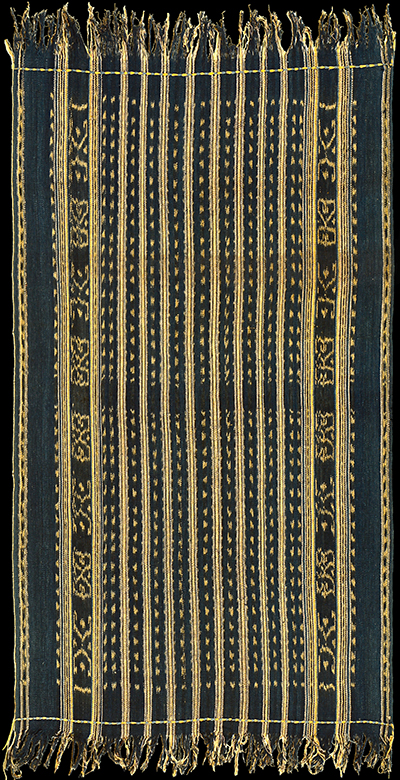| |
 
 | | | |
266 Moluccas, Tanimbar
Chest or turban cloth  
| | Locale: | Unidentified. | | Period: | Circa 1950� | | Yarn: | Cotton, hand-spun, medium | | Technique: | Warp ikat | | Panels: | 1 | | Design: | The widest ikated bands are decorated with scorpions and breast-beam/loom motifs. (The same motifs as on PC 269 but technically less accomplished execution.) The narrow ikated stripes are all decorated with small triangles, a motif that may be of Tanimbarese inspiration as it is more common on Babar than on Tanimbar, and Tanimbarese weavers often looked to Babar for inspiration. The inward curling scorpion is also typical for Babar. The white/yellow stripes separating them are all flanked by rows of dots, which protect the village from attack. | | Comment: | Most likely a woman's shawl, sjal, but may also be a man's turban cloth, as such cloths were used for both. Cloth has the pleasant rustic feel of hand spun cotton. Colours are natural. Ex collection J.B. Lüth. | | Background: | Chapters on Moluccas and Tanimbar. | | Compare: | 204 265 269 | | Sources: | Scorpion motif in Van Vuuren, Ikat from Tanimbar, Fig. 92, p. 131. Breast-beam/loom motif, Fig. 21, p. 149. Similar to circa 1900 cloth of greater technical refinement in Rautenstrauch Joest, depicted in Khan Majlis, Indonesische Textilien, Wege zu Goettern und Ahnen, Fig. 611, which has a similar overall lay-out and the same snake motifs bordering the selvedges, and is described as a possible turban cloth. The inward curling scorpion motif, as noted by Van Vuuren, is also seen on Babar cloth in Khan Majlis, Indonesische Textilien, Wege zu Goettern und Ahnen, Fig. 566. | | |

©Peter ten Hoopen, 2025
All rights reserved.
|
|


